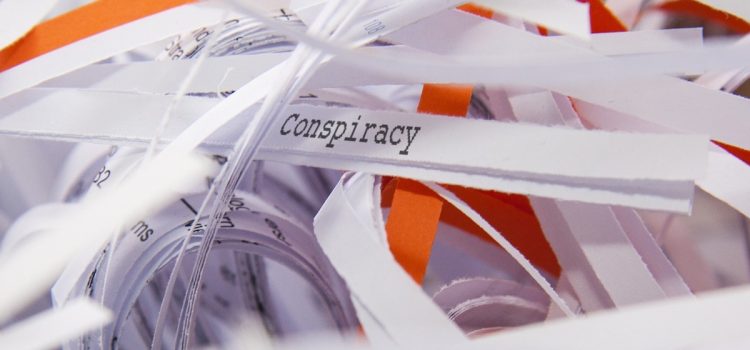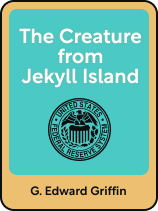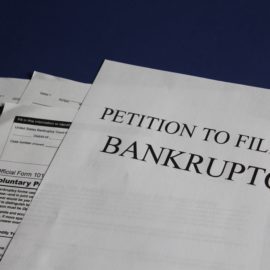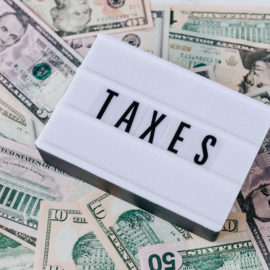

This article is an excerpt from the Shortform book guide to "The Creature from Jekyll Island" by G. Edward Griffin. Shortform has the world's best summaries and analyses of books you should be reading.
Like this article? Sign up for a free trial here.
What conspiracies are associated with the Federal Reserve? Is there anything to them?
Edward Griffin discusses two conspiracies that are said to be behind the Federal Reserve: the bank cartel conspiracy and the world domination conspiracy. Griffin believes that these help us understand what’s going on with the Fed specifically and economics and politics in general.
Keep reading to learn about these two Federal Reserve conspiracies.
Federal Reserve Conspiracies
Griffin feels that too many people dismiss conspiracy theories because they don’t believe that elite groups conspire to undermine institutions or the general public. In his view, explanations based on conspiracy tend to be more credible because they are consistent with human nature.
Humans naturally tend to be self-serving: With relatively few exceptions, they do what they think is most likely to increase their own wealth, power, or happiness. So, if they think they can get ahead by forming secret alliances with other influential people (and if they think they can get away with it), then they do it. As such, Griffin believes there are always webs of conspiracy running through and behind the power structures of every civilization. The more we uncover these conspiracies (including the Federal Reserve conspiracies) and their intentions, the better we can understand history and current events.
The Bank Cartel Conspiracy
In the case of the Federal Reserve, prominent bankers wanted to form a cartel—a secret coalition that limits competition by standardizing prices and practices across supposedly-competing businesses within an industry. In this way, they hoped to increase their profits and bring the rest of the nation’s banks at least loosely under their control by forcing them to join the cartel. When they met on Jekyll Island, they designed the Federal Reserve System to function as a banking cartel.
Griffin explains that disguising the banking cartel as a government agency not only gave it the appearance of legality and legitimacy but also gave it two important advantages over most cartels:
- First, through its relationship with the government, it could use tax dollars to fund its operations and bail out its members if any of them got into financial trouble.
- Second, it made use of the government’s police powers to enforce the cartel’s decisions. Griffin notes that many cartels fail because their members don’t trust each other and end up competing with each other in spite of cartel agreements. Using the government to police the members of the cartel prevents this from happening.
The World Domination Conspiracy
But, Griffin’s conspiracy is about more than just profits; it’s also about power. Griffin asserts that many prominent people in the banking cartel, as well as their modern-day successors, also have ties to a secret society bent on literal world domination. In this society, a small, secret inside circle of leaders directs the actions of organizations that can operate in full view of the public because their members have no idea that their work is designed to advance the society’s secret agenda.
The society’s ultimate goal is to create a one-world government, which they would control by controlling the world’s wealth and providing financial backing only to political leaders they could easily manipulate.
According to Griffin, part of the secret society’s agenda involves weakening America’s economy, reducing America’s industrial capacity, and lowering Americans’ standard of living so that the United States will be less able to resist giving up national sovereignty to an international government. This would explain why the Federal Reserve facilitates so much harm to the American economy, even in ways that don’t necessarily generate profits for bankers.
| Are Conspiracies Inherently Unstable? Some people agree with Griffin that humans are, by nature, filled with selfish ambition, but contend that this actually prevents conspiracies from becoming very powerful. Oxford physicist David Grimes even formalized this argument into a mathematical model. According to this view, a few individuals acting in isolation generally can’t accomplish much on their own. So, to become powerful, conspiracies have to become relatively large. But the more people who are in on the conspiracy, the harder it is to keep the organization secret, and the more likely the conspiracy will be exposed. Given that conspiracies depend on secrecy for survival and success, there’s always a temptation for a self-interested member to expose the conspiracy in hopes of being rewarded by those who oppose the conspiracy’s agenda. And the likelihood of someone yielding to that temptation increases as the size of the organization increases, creating a catch-22: If the conspiracy remains small, it will never be very powerful, but if it grows large it will eventually be exposed and fall apart. Griffin would probably concede that there is some validity to this principle, given his acknowledgment that many cartels fail because of internal distrust among members. However, he argues that this problem can be overcome through careful design of the organization—an argument that philosophy professor Kurtis Hagen has also made more formally. In the case of the world domination conspiracy, Griffin explains that the secret society is designed to have multiple layers that allow it to function with minimal threat of exposure: The real leaders are part of a small inner circle, whose very existence is a closely-guarded secret. |

———End of Preview———
Like what you just read? Read the rest of the world's best book summary and analysis of G. Edward Griffin's "The Creature from Jekyll Island" at Shortform.
Here's what you'll find in our full The Creature from Jekyll Island summary:
- How the Federal Reserve System destabilizes the economy
- Why banks are encouraged to engage in fraudulent practices that harm the public
- How the Federal Reserve can be abolished






